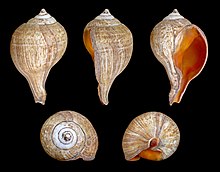Turbinellidae are a family of sea snails, marine gastropod mollusks in the clade Neogastropoda. Members of this family are predators.[2]
| Turbinellidae | |
|---|---|

| |
| Turbinella pyrum | |
| Scientific classification | |
| Domain: | Eukaryota |
| Kingdom: | Animalia |
| Phylum: | Mollusca |
| Class: | Gastropoda |
| Subclass: | Caenogastropoda |
| Order: | Neogastropoda |
| Superfamily: | Turbinelloidea |
| Family: | Turbinellidae Swainson, 1835 |
| Genera | |
|
See text | |
| Synonyms[1] | |
| |
Distribution
editSpecies in this family are found worldwide, mostly in tropical shallow waters but some in deep waters.
Subfamilies
edit- sub-family Columbariinae Tomlin, 1928
- genus Columbarium Martens, 1881
- genus Coluzea Finlay, 1926
- genus Fulgurofusus Grabau, 1904
- genus Fustifusus Harasewych, 1991
- genus Peristarium Bayer, 1971
- sub-family Tudiclinae Cossmann, 1901
- genus Tudicla Röding, 1798
- sub-family Turbinellinae Swainson, 1835
- genus Cryptofusus Beu, 2011
- genus Syrinx Röding, 1798
- genus Turbinella Lamarck, 1799
- sub-family Vasinae H. Adams & A. Adams, 1853 (1840)
- genus Altivasum Hedley, 1914
- genus Enigmavasum Poppe & Tagaro, 2005
- genus Pisanella Koenen, 1865
- genus Tudivasum Rosenberg & Petit, 1987
- genus Vasum Röding, 1798
- genus Pisanella Koenen, 1865 †
- Genera brought into synonymy
References
editWikimedia Commons has media related to Turbinellidae.
- ^ Exilia Conrad, 1860. Retrieved through: World Register of Marine Species on 11 April 2012.
- ^ Ponder, Winston Frank; Lindberg, David R.; Ponder, Juliet Mary (2019). Biology and Evolution of the Mollusca. CRC Press. p. 1934. ISBN 978-1-351-11564-3.
- Costello, M.J.; Emblow, C.; White, R. (Ed.). (2001). European register of marine species: a check-list of the marine species in Europe and a bibliography of guides to their identification. Collection Patrimoines Naturels, 50. Muséum national d'Histoire Naturelle: Paris, France. ISBN 2-85653-538-0. 463 pp.
- Dekkers, A.; Maxwell, S. (2018). "Altivasum Hedley, 1914 (Gastropoda: Turbinellidae) from South Western Australia". The Festivus. 50 (4): 245–255. doi:10.54173/F504245.